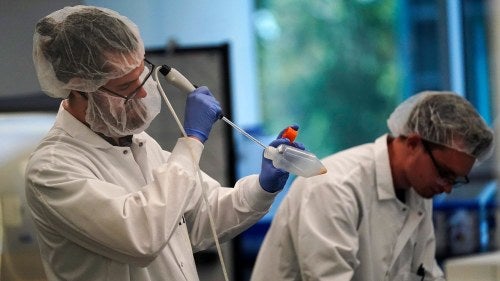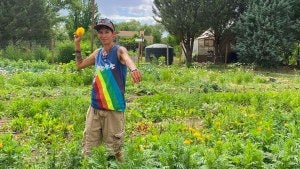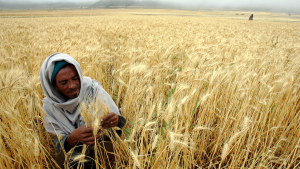AI Ice Cream, Meatless Meat? and Queering Agriculture
Check out our roundup of the week's top news and research in food, agriculture, and global development.

Top Story
Tigray Loses Food Aid
More than 700 people in Tigray have died following the US and UN decision to halt food aid to the region after the Ethiopian government purportedly stole the food as a war tactic. The US and UN extended the shipment pause to the rest of Ethiopia in early June, affecting over 20 million people in need of immediate food assistance.
Council Insights
Queering Agriculture
"Through questioning what it means to be a farmer and what farming practices can look like, queer farmers are challenging cisheteropatriarchal legacies in agriculture and envisioning a food and agriculture system that uplifts and celebrates LBGTQIA+ people,” writes Natalie Burdsall in Global Food for Thought. Read the blog to learn about the stories of four farmers in the US.
 Food and Agriculture
Food and Agriculture
Food and Agriculture
Prolonged Heat
India’s monsoon season is bringing extreme heat to the region, reducing crop productivity and livestock health. Future heatwaves are expected, as the IPCC predicts India will be among the countries most affected by the climate crisis.
Switzerland-Sized Deforestation
The 2030 goal of zero deforestation is slipping away. In 2022, 10.2 million acers—the size of Switzerland—were lost, harming biodiversity and increasing carbon emissions. The World Resources Institute’s Global Forest Watch found 40 percent of the deforestation resulted from Bolsonaro’s leadership. Agriculture was also a substantial contributor.
Climate Challenges
China's ambition to achieve self-reliance in its food supply is facing setbacks due to climate shocks. Heavy rainfall in central China devastated the wheat harvest, underscoring the vulnerability of the country's food supply to climate change. Other challenges like urbanization and water distribution disparities continue to pose threats to China's food security.
Deeper Dive
What’s Happening in Tigray?
The conflict in Tigray has been ongoing since 2020, killing hundreds of thousands of people and displacing millions more. Fueling the region’s famine, the crisis leaves at least 80 percent of the population food insecure, largely at the hands of the Ethiopian government. Check out our blog post on the war to learn more.
 Food and Agriculture
Food and Agriculture
Resilience
Climate-Neutral Farming
A new four-year initiative funded by the European Commission aims to develop and upscale systemic solutions for climate-neutral and climate-resilient farms through a case study approach. By promoting the adoption of sustainable farming practices, the project hopes to achieve climate-neutral farming across Europe by 2050.
DC Report
Biofuel’s Goldilocks Problem
Politicians are celebrating the Biden administration’s expansion of biofuel mandates, helping slash carbon emissions. But producers say the EPA’s mandates fell short of industry production capabilities, concerning soybean producers and processors. The EPA reasoned that if biofuel production increased too much, it may lead to a scarcity of vegetable oil and raise food prices.
Big Actors
Meatless Meat?
Two companies—Upside Foods and Good Meat—received USDA approval to sell lab-grown meat, making the US the second country after Singapore to allow sales of the product. Both companies plan to sell their products at high-end restaurants before scaling production to reach lower costs.
Big Ideas
AI Ice Cream
The ice cream industry is undergoing an AI evolution to reduce supply chain inefficiencies and input waste. Using FarmBot and SAP Intelligent Agriculture, which help automatically measure and manage field conditions and provide integrated data from satellite-based imagery, respectively, farmers are able to optimize growing conditions.
Ask an Expert
How can organizations prioritize and respond to issues of social inclusion in agriculture?
"Social inclusion is a matter of looking at adoption pathways and scaling and identifying the problems...It is a constant journey and it is a constant learning, and we for sure slip every once in a while, but also that is important to have tools and to be able to proactively respond to those feedback loops. So, sometimes I believe it's also a culture of accepting that we're learning by doing, but that we are ready to rapidly fail and then learn and move forward."
— CIMMYT Director General Bram Govaerts in ep. 9 of Youth in Agriculture


Have a question about food and agriculture? Ask one of our experts at the Center on Global Food and Agriculture to get an answer in next week's Global Food for Thought!
Council Events
Did you miss one of our previous livestreams? Don't worry! They are all available on our website to watch at any time.
Other Upcoming Events
Seeding Sale
Date: July 1
Time: 9:00 a.m. - 4:00 p.m. CT
UGC Farm Stand
Date: July 1
Time: 9:00 a.m. - 4:00 p.m. CT
IFAD Innovation Talk: Building an Innovation Engine
Date: July 6
Time: 2:00-3:00 p.m. CEST
Research Findings on Resilience and Social Cohesion in Burkina Faso and Niger
Date: July 11
Time: 9:00-10:30 a.m. ET
Irregular Migration and Food Security: A View from West Africa
Date: July 20
Time: 9:30-11:00 a.m. ET
Land Acknowledgement Statement
The Center on Global Food and Agriculture recognizes it occupies the ancestral land of the Kiikaapoi, Peoria, Kaskaskia, Bodwéwadmi, and Myaamia people. Indigenous communities around the world disproportionately experience the pressures of climate change, global conflicts, and the COVID-19 pandemic, while simultaneously stewarding 80 percent of the world’s biodiversity. These Indigenous tribes and nations are the original owners of this land and continue to be systemically erased by policies and practices that ignore their histories. To learn more about Indigenous foodways and practices, check out our 2022 blog series "Stewardship, Sovereignty, and Solutions."
Related Content
- Embracing Dandelions as Food and Medicine
- Going Beyond Regenerative Agriculture on Tribal Lands
- Expanding "638" to Enhance Native American Food Sovereignty
- Flavors and Culture: Food Systems Through Indigenous Women's Eyes
- A Thanksgiving Legacy: Fighting for Indigenous Food Sovereignty
- Native Food Sovereignty: Strengthening Connection to Culture
- Reconnecting to Indigenous Food Sovereignty Values and Practices
- Embracing Interconnectedness: How Indigenous Foodways Can Save Us






